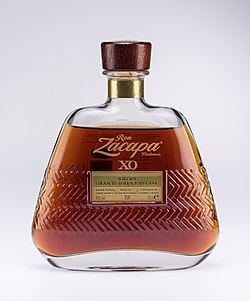Production
The base fermentable is derived from sugar cane, which is then juiced, and then reduced to a syrup. [3] It is then fermented with yeast, and the resulting wine is distilled in a double-column still to a high proof, lightly flavored distillate, typical of Spanish-style rum production. All Zacapa rums are aged in the solera method, where the rum does not have a distinct age, but rather, new rum is added to old rum and blended in a series of casks. The rums start in ex-bourbon casks, before moving to re-charred whiskey barrels, then ex-sherry, before finishing in ex-Pedro Ximénez barrels. [3] All of this occurs at a facility 2.3km above sea level, where the air is cool and moist, [8] which significantly slows loss to evaporation compared to tropical aging.
Rum experts have accused Zacapa of being misleading in their labeling, suggesting that the large 23 on the bottle is likely to mislead consumers into believing that the rum is aged for 23 years. [9] However, the rum is actually a blend ranging from 6 to 23 years, mostly skewed towards the younger end, and disguised with added sugar. [10] In 2021, a class-action lawsuit was filed against Diageo, claiming that consumers were fooled into believing that Ron Zacapa Centenario 23 was aged for 23 years. [11] [12] Likewise, maturation in cool, moist climates significantly slows down the aging process, resulting in a product more comparable to a rum aged for a shorter length of time in a tropical climate. [9]
Despite starting from sugar cane, sugar does not make it past the distillation process, and Zacapa strongly deny that they adulterate the final product in any way. Consumers note that Zacapa rums are particularly smooth and sweet, [3] a result that Zacapa claims comes from the unique aging and blending process. [13] However, independent testing has confirmed that the sugar levels are nearly 20g/L. [10] Likewise, the deep brown color can only be partially attributed to the solera aging, as the rum is artificially dyed, [10] and independent journalists have discovered the presence of glycerine, a substance used to add sweetness and mouthfeel to rum. [14] [15]
This page is based on this
Wikipedia article Text is available under the
CC BY-SA 4.0 license; additional terms may apply.
Images, videos and audio are available under their respective licenses.


